7 books about Hiltebeitel, Alf
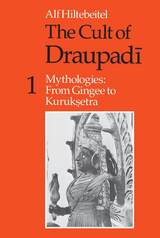
The Cult of Draupadi, Volume 1
Mythologies: From Gingee to Kuruksetra
Alf Hiltebeitel
University of Chicago Press, 1988
This is the first volume of a projected three-volume work on the little-known South Indian folk cult of the goddess Draupadi and on the classical epic, the Mahabharata, that the cult brings to life in mythic, ritual, and dramatic forms. Draupadi, the chief heroine of the Sanskrit Mahabharata, takes on many unexpected guises in her Tamil cult, but her dimensions as a folk goddess remain rooted in a rich interpretive vision of the great epic. By examining the ways that the cult of Draupadi commingles traditions about the goddess and the epic, Alf Hiltebeitel shows the cult to be singularly representative of the inner tensions and working dynamics of popular devotional Hinduism.
[more]
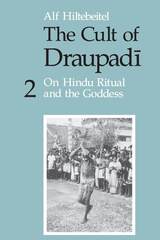
The Cult of Draupadi, Volume 2
On Hindu Ritual and the Goddess
Alf Hiltebeitel
University of Chicago Press, 1991
This is the first volume of a projected three-volume work on the little-known South Indian folk cult of the goddess Draupadi and on the classical epic, the Mahabharata, that the cult brings to life in mythic, ritual, and dramatic forms. Draupadi, the chief heroine of the Sanskrit Mahabharata, takes on many unexpected guises in her Tamil cult, but her dimensions as a folk goddess remain rooted in a rich interpretive vision of the great epic. By examining the ways that the cult of Draupadi commingles traditions about the goddess and the epic, Alf Hiltebeitel shows the cult to be singularly representative of the inner tensions and working dynamics of popular devotional Hinduism.
[more]
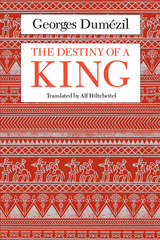
The Destiny of a King
Georges Dumézil
University of Chicago Press, 1988
The preeminent scholar of comparative studies of Indo-European society, Georges Dumézil theorized that ancient and prehistoric Indo-European culture and literature revolved around three major functions: sovereignty, force, and fertility. This work treats these functions as they are articulated through "first king" legends found in Indian, Iranian, and Celtic epics, particularly the Mahabharata. Dumézil, drawing on an extraordinarily broad range of Indo-European sources from Scandinavia to India and offering an original and provocative analytic method, set a new agenda for studies in comparative oral literature, historical linguistics, comparative mythology, and history of religions.
The Destiny of a King examines one of the "little" epics within the Mahabharata—the legend of King Yayati, a distant ancestor of the Pandavas, the heroes of the larger epic. Dumézil compares Yayati's attributes and actions with those of the legendary Celtic king Eochaid Feidlech and also finds striking similarities in the stories surrounding the daughters of these two kings, the Indian Madhavi and the Celtic Medb. When he compares these two traditions with the "first king" legends from Iran, he finds such common themes as the apportionment of the earth and the "sin of the sovereign."
The Destiny of a King examines one of the "little" epics within the Mahabharata—the legend of King Yayati, a distant ancestor of the Pandavas, the heroes of the larger epic. Dumézil compares Yayati's attributes and actions with those of the legendary Celtic king Eochaid Feidlech and also finds striking similarities in the stories surrounding the daughters of these two kings, the Indian Madhavi and the Celtic Medb. When he compares these two traditions with the "first king" legends from Iran, he finds such common themes as the apportionment of the earth and the "sin of the sovereign."
[more]
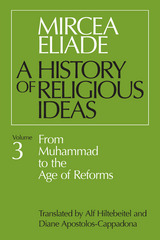
History of Religious Ideas, Volume 3
From Muhammad to the Age of Reforms
Mircea Eliade
University of Chicago Press, 1985
This volume completes the immensely learned three-volume A History of Religious Ideas. Eliade examines the movement of Jewish thought out of ancient Eurasia, the Christian transformation of the Mediterranean area and Europe, and the rise and diffusion of Islam from approximately the sixth through the seventeenth centuries. Eliade's vast knowledge of past and present scholarship provides a synthesis that is unparalleled. In addition to reviewing recent interpretations of the individual traditions, he explores the interactions of the three religions and shows their continuing mutual influence to be subtle but unmistakable.
As in his previous work, Eliade pays particular attention to heresies, folk beliefs, and cults of secret wisdom, such as alchemy and sorcery, and continues the discussion, begun in earlier volumes, of pre-Christian shamanistic practices in northern Europe and the syncretistic tradition of Tibetan Buddhism. These subcultures, he maintains, are as important as the better-known orthodoxies to a full understanding of Judaism, Christianity, and Islam.
As in his previous work, Eliade pays particular attention to heresies, folk beliefs, and cults of secret wisdom, such as alchemy and sorcery, and continues the discussion, begun in earlier volumes, of pre-Christian shamanistic practices in northern Europe and the syncretistic tradition of Tibetan Buddhism. These subcultures, he maintains, are as important as the better-known orthodoxies to a full understanding of Judaism, Christianity, and Islam.
[more]
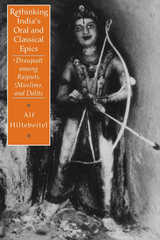
Rethinking India's Oral and Classical Epics
Draupadi among Rajputs, Muslims, and Dalits
Alf Hiltebeitel
University of Chicago Press, 1999
Throughout India and Southeast Asia, ancient classical epics—the Mahabharata and the Ramayana—continue to exert considerable cultural influence. Rethinking India's Oral and Classical Epics offers an unprecedented exploration into South Asia's regional epic traditions.
Using his own fieldwork as a starting point, Alf Hiltebeitel analyzes how the oral tradition of the south Indian cult of the goddess Draupadi and five regional martial oral epics compare with one another and tie in with the Sanskrit epics. Drawing on literary theory and cultural studies, he reveals the shared subtexts of the Draupadi cult Mahabharata and the five oral epics, and shows how the traditional plots are twisted and classical characters reshaped to reflect local history and religion. In doing so, Hiltebeitel sheds new light on the intertwining oral traditions of medieval Rajput military culture, Dalits ("former Untouchables"), and Muslims.
Breathtaking in scope, this work is indispensable for those seeking a deeper understanding of South Asia's Hindu and Muslim traditions.
This work is the third volume in Hiltebeitel's study of the Draupadi cult. Other volumes include Mythologies: From Gingee to Kuruksetra (Volume One), On Hindu Ritual and the Goddess (Volume Two), and Rethinking the Mahabharata (Volume Four).
Using his own fieldwork as a starting point, Alf Hiltebeitel analyzes how the oral tradition of the south Indian cult of the goddess Draupadi and five regional martial oral epics compare with one another and tie in with the Sanskrit epics. Drawing on literary theory and cultural studies, he reveals the shared subtexts of the Draupadi cult Mahabharata and the five oral epics, and shows how the traditional plots are twisted and classical characters reshaped to reflect local history and religion. In doing so, Hiltebeitel sheds new light on the intertwining oral traditions of medieval Rajput military culture, Dalits ("former Untouchables"), and Muslims.
Breathtaking in scope, this work is indispensable for those seeking a deeper understanding of South Asia's Hindu and Muslim traditions.
This work is the third volume in Hiltebeitel's study of the Draupadi cult. Other volumes include Mythologies: From Gingee to Kuruksetra (Volume One), On Hindu Ritual and the Goddess (Volume Two), and Rethinking the Mahabharata (Volume Four).
[more]
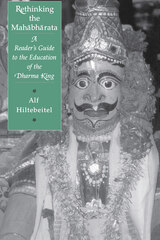
Rethinking the Mahabharata
A Reader's Guide to the Education of the Dharma King
Alf Hiltebeitel
University of Chicago Press, 2001
The ancient Indian Sanskrit tradition produced no text more intriguing, or more persistently misunderstood or underappreciated, than the Mahabharata. Its intricacies have waylaid generations of scholars and ignited dozens of unresolved debates. In Rethinking the Mahabharata, Alf Hiltebeitel offers a unique model for understanding the great epic. Employing a wide range of literary and narrative theory, Hiltebeitel draws on historical and comparative research in an attempt to discern the spirit and techniques behind the epic's composition. He focuses on the education of Yudhisthira, also known as the Dharma King, and shows how the relationship of this figure to others-especially his author-grandfather Vyasa and his wife Draupadi-provides a thread through the bewildering array of frames and stories embedded within stories. Hiltebeitel also offers a revisionist theory regarding the dating and production of the original text and its relation to the Veda. No ordinary reader's guide, this volume will illuminate many mysteries of this enigmatic masterpiece.
This work is the fourth volume in Hiltebeitel's study of the Draupadi cult. Other volumes include Mythologies: From Gingee to Kuruksetra (Volume One), On Hindu Ritual and the Goddess (Volume Two), and Rethinking India's Oral and Classical Epics (Volume Three).
This work is the fourth volume in Hiltebeitel's study of the Draupadi cult. Other volumes include Mythologies: From Gingee to Kuruksetra (Volume One), On Hindu Ritual and the Goddess (Volume Two), and Rethinking India's Oral and Classical Epics (Volume Three).
[more]

Stories about Posts
Vedic Variations around the Hindu Goddess
Madeleine Biardeau
University of Chicago Press, 2004
Stories about Posts is the magnum opus of Madeleine Biardeau, one of the most influential Indologists of the twentieth century. Nearly twenty years in the making, it connects her varied studies on the Sanskrit epics, the Hindu Goddess, Vedic sacrifice, rural India, and the interpretation of Hinduism.
After exploring several ethnographic facts that have escaped the notice of previous observers, Biardeau presents a variety of hunches, hypotheses, and insights building up to the provocative thesis of Stories about Posts: that the variations found in the contemporary cult of the Goddess—in both her royal and rural village aspects—reveal untraced regional histories of the Vedic sacrificial post, the yupa. Biardeau's work opens up new ways of thinking about Vedic sacrificial themes and elements as they recur in post-Vedic texts and iconographies. It also connects wayside stones in Maharashtra named after the buffalo to stones, posts, and people named after a so-called Buffalo King in Maharashtra, Andhra Pradesh, Karnataka, and Tamilnadu.
A work of magnificent scholarship and fieldwork, Stories about Posts, in ways no previous work has attempted, much less accomplished, unravels much of the mystery surrounding contemporary Hindu ritual by connecting it to the ancient Sanskrit epics. As such, it will fascinate students of Indology, religious studies, and anthropology for years to come.
After exploring several ethnographic facts that have escaped the notice of previous observers, Biardeau presents a variety of hunches, hypotheses, and insights building up to the provocative thesis of Stories about Posts: that the variations found in the contemporary cult of the Goddess—in both her royal and rural village aspects—reveal untraced regional histories of the Vedic sacrificial post, the yupa. Biardeau's work opens up new ways of thinking about Vedic sacrificial themes and elements as they recur in post-Vedic texts and iconographies. It also connects wayside stones in Maharashtra named after the buffalo to stones, posts, and people named after a so-called Buffalo King in Maharashtra, Andhra Pradesh, Karnataka, and Tamilnadu.
A work of magnificent scholarship and fieldwork, Stories about Posts, in ways no previous work has attempted, much less accomplished, unravels much of the mystery surrounding contemporary Hindu ritual by connecting it to the ancient Sanskrit epics. As such, it will fascinate students of Indology, religious studies, and anthropology for years to come.
[more]
READERS
Browse our collection.
PUBLISHERS
See BiblioVault's publisher services.
STUDENT SERVICES
Files for college accessibility offices.
UChicago Accessibility Resources
home | accessibility | search | about | contact us
BiblioVault ® 2001 - 2024
The University of Chicago Press









